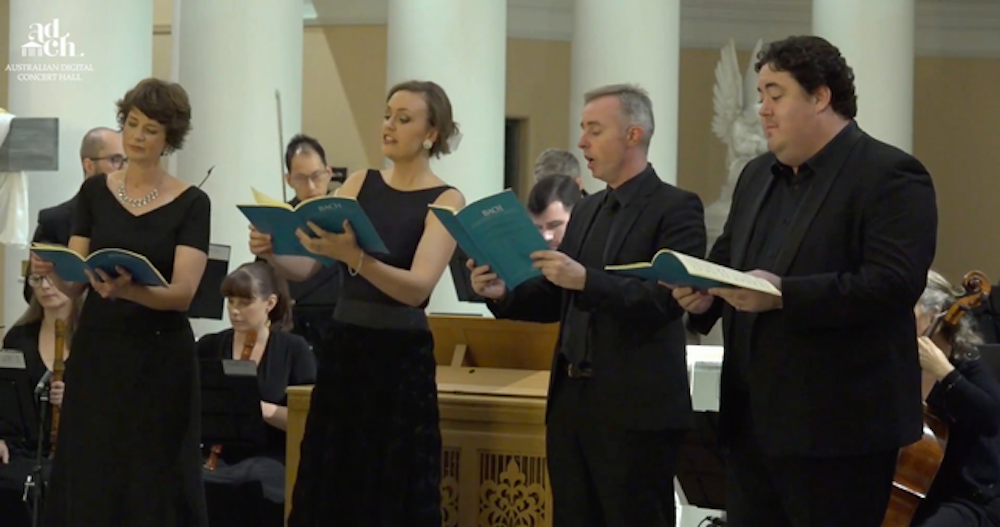Bach’s cantata Brich dem Hungrigen dein Brot begins distinctively with an elaborate ritornello. It is a cooing exchange between winds and strings. It depicts the image evoked by the text, of one ‘breaking bread’ for the needy. This is a theme to which Bach gave voice in his earlier cantata, Die elenden sollen essen (‘The miserable shall eat’).
There was a slightly rocky start on oboes, but the overall effect was a nostalgic, almost eery, ambience. The one-to-a-part setting for the voices was effective. So powerful was each singer that it gave the impression of a fully-blown choir. However, the voices seemed sometimes to be dissipated in the sparse acoustics of Chatswood’s Our Lady of Dolours Church.
The choir moves out of the paced chorale fantasia mode and into a dance-like reverie when Richard O’Connor picks up the tempo on “So du einen nackend siehest”. There were some mis-matches in timing between Richard Butler and the continuo on “Alsdenn wird dein Licht”, but this is a particularly busy section.
O’Connor rounds off the first recitative with a commanding melisma on the final word – “dringen”. The alto aria was something of a pastorale. Hannah Fraser’s voice smiled upon its audience.
The ‘Second Part’ of the cantata begins more imposingly. O’Connor exhorts us, with his commanding voice, “Do not forget to do good and to share”. It is sung with all the force of an Old Testament admonition – and that it is (Hebrews 13:16). In contrast, the soprano aria was sung by Susannah Lawergren with quivering vibrato and a beautifully delicate child-like voice. The accompaniment on recorders by Mikaela Oberg and Alicia Crossley was like a ray of sunshine.
But a Bach cantata would not be complete without a rousing chorale. There is some delicious experimentation with modulation toward the end, on ‘empfangen’. And then we return to the home key.
We then enter the soundworld of the instrumental Baroque. The ensemble performed an arrangement of Bach’s Concerto in E (BWV 1053) for violin, in D. The arrangement is by Kati Debretzeni, who distinguished herself as a renowned violinist under the direction of Sir John Eliot Gardiner. The extant work on which it is based is a harpsichord concerto. But, consistently with Bach’s known practice of refashioning violin concerti to harpsichord concerti, this probably began as a violin concerto anyway.
The piece begins like a ray of sunshine, or the call of a hunting horn. The siciliano was incredibly soft, almost glassy. The Allegro at times became jumbled, but one gets a sense of Zimmerman’s coffeehouse – busy conviviality, like a scene of William Hogarth’s.
After an intermission came another cantata, “Herz und Mund und tat und Leben”. This is a real crowd-pleaser. The arias are uniformly pleasing, and even the recitatives are catchy. Butler stood out with his articulation in the opening Coro, which is no mean feat when it is played at such a lively tempo. Much the same could be said of the trumpeter’s dexterity at this pace. Lawergren’s voice was lofty and elevated the chorus.
Hannah Fraser then brought a powerful and clear voice to what is an aria with meandering, sinuous lines. Her performance was as clear as a recitative.
The opening chord of the ‘Verstockung’ recitative demands attention. It prepares us for the following aria, which itself is centred on the theme of preparing paths. The Bereite dir, Jesu was by far the best-performed aria of the two cantatas. Madeleine Easton’s accompaniment on violin was so incredibly thoughtful, well-sustained and delicate that it was hard not to mistake it for Lawergren’s crystalline voice. It was the highlight of the afternoon.
Adam Masters brings out the oboe da caccia in the third recitative. The seried structured – taking turn between oboes da caccia and voice – is redolent of the Passion recitatives that were to follow. This is all sealed with a strangely contrapuntal finish.
The closing chorale is another exercise in the form of the chorale fantasia – the hymn is superimposed on top of a well-developed pastoral counter-subject.
